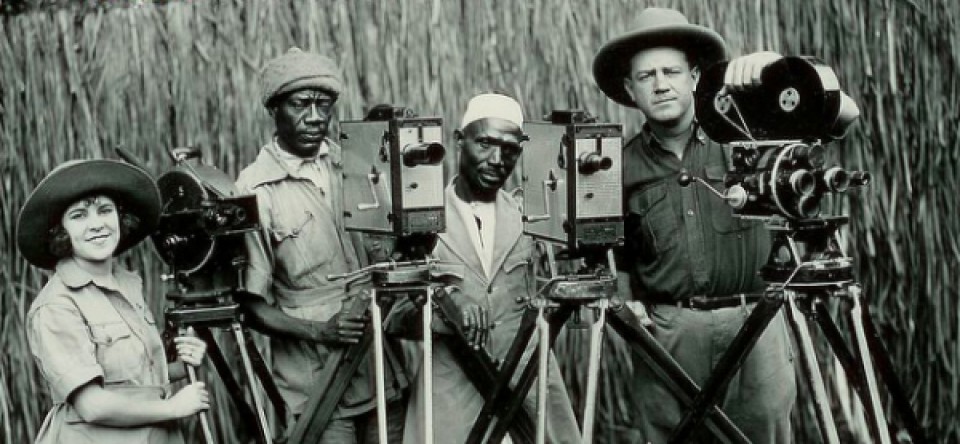I quite enjoyed the film of La Noire de by Ousmane Sembene, and I particularly enjoyed the way the director made the protagonist Diouana pretty much silent throughout the film, using her to emphasize her silence as a woman, and a woman of colour at that, as well as using her as a metaphor for the suffering the colonised have under their colonial masters.
Diouana’s silence acts as a metaphor for the control that the French colonial masters have exerted over their Senegalese colony and its people, and it is seen not only in Diouana’s silence, but with the fact that she speaks French more often than her own native tongue, and when her mother writes her a letter, her master helps her to reply it and writes a letter with words that Diouana herself disapproves of. This lack of a language and the constant silence towards Diouana’s masters shows how the Senegalese people are being controlled by their colonial masters through language, preventing them from accessing their historical and cultural heritage. The use of language to subjugate a population is exemplified in George Orwell’s 1984, where the language, Newspeak, is also used to control the population by omitting certain words from it, and the idea behind this is once you remove certain words from a language, you remove the resulting thoughts associated with it. Similarly, by introducing an entirely new language that is not privy to the traditional culture of the Senegalese, you remove certain parts of culture that would have otherwise existed or been emphasized had the original tongue of Wolof or Fula still existed as common usage. The result is that the French also place their expectations upon Diouana, calling her lazy and unused to independence.
Diouana’s silence also represents how she is prejudiced against both her gender and her race. In the film, Diouana’s guy friend speaks more than she does, while she rarely says anything. His commands to her to get off the memorial also sort of demonstrates who is in charge of whom. This few scenes show that as a woman back in Senegal, she holds a lower status than the men, and she is prejudiced because of her gender. Not only is she prejudiced because of her gender, she also receives the undesired prejudice at the same time because of her race, which is clearly demonstrated in the relationship between her and her white mistress. Her white mistress clearly articulates how she feels on numerous occasions, whilst in contrast Diouana rarely speaks a word and is constantly belittled and berated by her white mistress. As a woman of colour, she is denied the solidarity with her white sisters in that fight for gender equality, as mentioned in one sociological article by Simone de Beauvoir, titled The Second Sex: Woman as Other, where she laments the fact that woman are unable to unify because of class and racial differences against men, writing, “(the white woman) feel solidarity with men of that class…(their) allegiance is to white men, not to Negro women.” To put it in perspective, the white woman is lower than the white man, the black man is lower than the both of them, and the black woman is the lowest out of all of them. I am also reminded of the poor silent black girl who was about to be sacrificed to Kong in the 1933 King Kong film. Upon seeing Anne, the tribe’s chieftain immediately wishes to trade ten black girls for her, which sort of says that ten black girls are not nearly comparable to a white woman, relegating her to the bottom of the barrel and at the same time commodifying all women as tradeable goods.
As mentioned in Nicole Fleetwood’s reading, she quotes Evelyn Hammond, who argues that “historically, black women have reacted to this repressive force of the hegemonic discourses on race and sex with silence, secrecy and a partially self-chosen invisibility,” which means that Diouana’s silence is her reacting to her colonial master’s, and mistress’s repression upon her, but at the same time, Fleetwood also mentions that this silence is necessary for the dominant visual culture, as the “irresolvability of the black female body” is a “troubling presence in dominant visual culture.” If there were no silence on the part of the black woman, the dominant visual culture would face an attack upon their ideologies, but because there is silence on the part of Diouana, her master and mistress are able to project whatever they think upon her, without her having a say in the matter, further rendering her more invisible.
However, I find that Diouana’s silence is also a powerful weapon that she wields against her colonial masters, frustrating them as they do not know what to expect or think of her. In an example of the use of silence, an American spy plane was shot down during the Cold War over China, and the Americans asked the Chinese government to return the remains of the plane back to them, but to which the Chinese said nothing for a very long time, not because they did not know what was going on, but because they wanted to exert power over the Americans, making them squirm as they wait for news of the downed spy plane. The little boy at the end of the film who follows Diourana’s master back to his car while wearing his mask also exemplifies this: the boy does not say a single word but just wears the mask and follows the man, which clearly unnerves the white man as he does not know what to make of this, and he hastens to his car to depart the country. In a way, there exists a power within the colonised over their colonial masters in the form of the mystery surrounding that silence.
